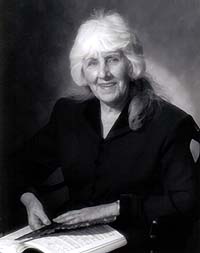Other Links
<Editorial Board
- Editor - Bill Kenny
- London Editor-Melanie Eskenazi
- Founder - Len Mullenger
Google Site Search
SEEN
AND HEARD INTERNATIONAL OPERA REVIEW
Puccini, La Bohème:
Kitsap Opera, soloists, cond. Leone Cottrell-Adkins, dir.
Tom Sunderland, set designer Emily Andrews, stage manager and
choreographer Theresa Ballew, technical direction and lighting
design Mark Thomason, Admiral Theatre, Bremerton, WA, 8.11. 2007 (BJ)
There is much to be said for pyramidal theories about the health
of a musical culture: it is much likelier to be healthy at the top
if there is a broad and healthy base to support it. About opera,
specifically, it is possible to take a different view. That art
form is so complex and sophisticated in its demands that a
satisfactory presentation, one might feel, requires a
corresponding level of sophistication, and perhaps of experience
and professionalism. Grassroots opera, on that view, sounds like
an oxymoron.
The Kitsap Opera Web Site is
Here

Leone Cottrell-Adkins
All the more credit, then, to Kitsap Opera–a largely amateur
company that endeavors to keep homegrown opera alive in a largely
rural and blue-collar county across Puget Sound from Seattle–for
mounting a highly creditable La Bohème as this season’s
production at the handsome Admiral Theatre in Bremerton.
It would have been silly to look in this context for the grander
effects that characterized Seattle Opera’s Bohème last
season. And yet this more intimate, almost domestic production was
quite delightful in its own way. Emily Andrews’s sets were simple
but effective (and incidentally, an extremely quiet and attentive
audience won my gratitude by not disrupting the music with
applause for the scenery when the curtain opened). Tom
Sunderland’s direction was authoritative in its marshaling of both
small and larger groups around the stage, and there was absolutely
no silliness to be endured. That may sound like faint praise–but
you might be surprised at how often opera directors these days
feel the need to use articles of furniture for any purpose other
than that they were designed for. So let me congratulate Mr.
Sunderland warmly on the fact that nobody sat on a table or stood
on a chair.
Such ensemble virtue would, it need hardly be said, be in vain
without singers on stage with the ability to project their
characters in a manner both convincing and engaging. In this
regard, the Kitsap production was close to faultless. The star,
and the outstanding figure by a long way, was the tenor Gino
Lucchetti as Rodolfo. All the more remarkably given that he was
singing with a recently broken arm in a sling, his voice rang out
at once commandingly and with ample nuance when that was required,
and he portrayed this rather feckless poet as a thoroughly likable
figure. Even when he was not singing, his attentive way of
watching his Mimì and responding to her was an object-lesson in
intelligent stage deportment. In that latter role Christina
Kowalski showed a pretty voice and much vocal skill. She is a
good-looking young woman, and she too could carry comparable
conviction as Mimì if she would only learn that lesson from her
Rodolfo–if she would occasionally unknit her brow, unfold her
arms, and lift her gaze from the floor. In her occasional moments
of animation, she did indeed radiate considerable charm.
Rodolfo’s three Bohemian friends were all strongly cast: Misha
Myznikov’s Marcello did everything, vocally and dramatically, that
the role demands, Michael Dunlap was a suitably cuddly Colline,
and Ryan Christopher Bede, looking every inch the young Great
Gatsby, lit up the scene with his tall and elegant presence.
Cherie Hughes was a highly believable Musetta–a little shrewish,
as she must be, in Acts II and III, but in Mimì’s death-scene
touching as she sheds her gold-digger persona to reveal a heart of
gold. David Borning offered three fetching cameos as Benoit,
Alcindoro, and the custom-house sergeant, and Kenny James did
equally well in the smaller roles of Parpignol and the custom
officer.
An 18-voice chorus sang and acted with gusto, and the essentially
amateur orchestra sounded quite astonishingly accomplished and
well-disciplined. Which brings me to the person without whom this
brave company could not exist: artistic director Leone
Cottrell-Adkins belongs in the grand tradition of gifted female
opera animators and conductors (remember Sarah Caldwell of Boston
Opera fame?), and she achieved wonders with the forces at her
disposal. What a pleasure and privilege it is for
Bernard Jacobson
Picture © Leone Cottrell-Adkins
